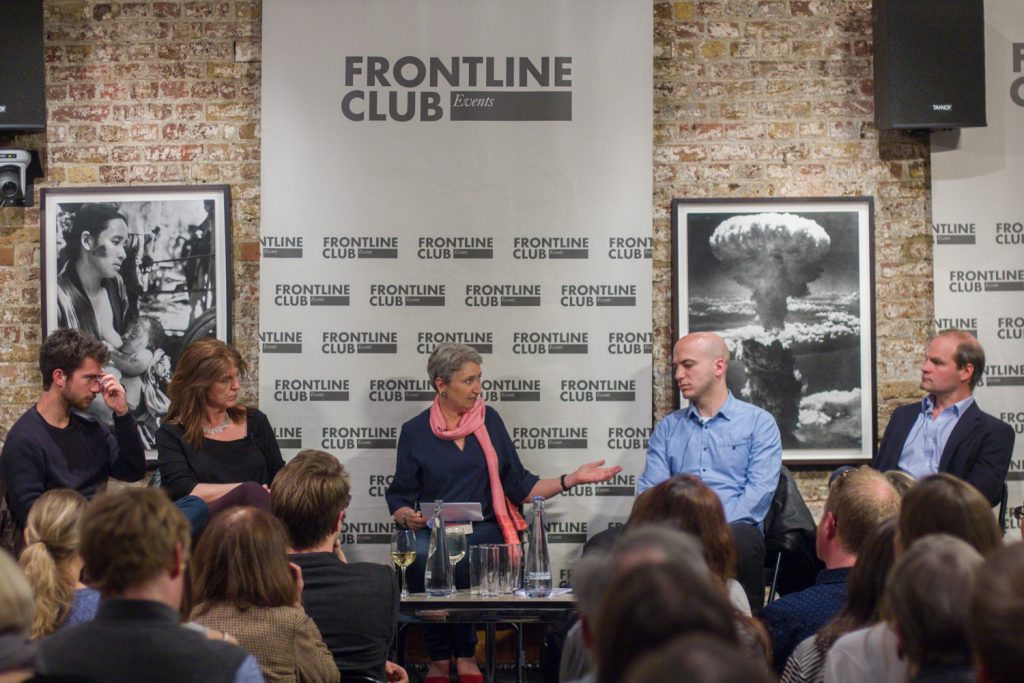Europe’s Refugee Crisis – The New Odyssey
From the disproportionate focus placed on the Mediterranean crossing, to the misconception that migration is negative by default and the idea that lobbying Turkey to allow Syrians to work is the answer, the panel dispelled the myths surrounding the crisis.
Patrick Kingsley, author of The New Odyssey and the Guardian‘s inaugural migration correspondent, began by speaking about his extensive reporting of the crisis. The central stories in his book range from that of a smuggler, to a civil servant, to a pregnant refugee woman. Kingsley writes of how he travelled across the Macedonian border with the pregnant woman, who believes the child she is carrying has died.
Heaven Crawley, a leading researcher of migration, said that Kingsley depicted the movement of people more completely than many correspondents before him. Media coverage often focuses only on the crossing to Greece, and yet, “the European focus on the journey across the Mediterranean is such a small part of it,” said Crawley.
Kingsley’s reporting navigates the different routes to Europe and explores the various driving factors of migration. This is important in a Europe where, Crawley said, “policy is about 15 years behind the dynamics of the movement.”
Hassan Akkad, a teacher and freelance photographer who fled the Assad regime in 2012, illustrated European ignorance on a personal level. When people hear the word refugee they expect to see a Syrian in rags, he said. “I’ve had people questioning me about why I had a cell phone.” And yet, many who have fled the war are middle class with much to contribute; Akkad is fluent in English and has studied Shakespeare.
Akkad went on to detail how he came to be in the UK. His crime, for which he suffered broken bones and solitary confinement, was protesting peacefully against Assad: “Protesting in Syria is like a suicide mission. You say goodbye to your family because you never know where you are going to end up,” he said.

L-R: Patrick Kingsley, Heaven Crawley, Lindsey Hilsum, Hassan Akkad, John Dalhuisen. Photo by Tolly Robinson
On the journey, the Syrians that Akkad travelled with were from all walks of life – and their first encounter with Europe was not a happy one. Greek marine forces launched an attack on their boat: “I felt like Syria was on a dinghy. And we were not welcome,” said Akkad. He told the audience that for now he has put his career as a teacher and photographer on hold in order to tell the story of the Syrian people, jokingly dubbing himself “the professional refugee.”
The chair, Channel 4’s international editor Lindsey Hilsum, turned the discussion towards possible solutions. In order to explain how circumstances had become so grave, John Dalhuisen of Amnesty International said that many European governments were enacting hostile asylum policies and closing their borders to prevent the far right from sweeping to power.
Dalhuisen said that this had intensified the crisis, which is almost unprecedented. “We’re looking at quite a distinct phenomenon,” he asserted.
Kingsley disagreed regarding the relative scale of the problem. “It’s actually quite small numbers,” he said. He argued that Europe, as the world’s wealthiest continent, has more than the capacity and resources to deal with the numbers arriving on its shores.
According to Kingsley, the surge in migration is a result of the poor management of legitimate passage to the UK. People were able to wait a few years in interim countries such as Turkey before being granted visas to Europe, but they could not wait the half-decade that they were forced to. “Resettlement provides a reason for people to stay put,” he said. After so long, with no legal means to achieve more prosperous and safe lives for themselves and their families, “inevitably, people decided to vote with their feet,” Kingsley added.
Crawley agreed: “The problem is at our end, we haven’t adjusted,” she said. She dismissed the arbitrary way in which European governments treat all the countries from which people are migrating as if they are the same. “What we need in policy terms is nuance,” she said. And the whole conversation around the issue needs to shift: “The idea of the end point being to stop people is nonsense,” she said.
An audience member asked about the responsibility of the wealthy neighbouring Gulf states. Akkad responded that despite presenting itself as the “mother of Islam”, Saudi Arabia had offered fleeing Syrians no support. Kingsley added: “We shouldn’t judge our response by the yardstick of the Gulf states… it doesn’t mean we shouldn’t be doing more as well.”
One journalist in the audience asked how it is possible to maintain public interest on such an ongoing humanitarian crisis. Following the surge in media attention in 2015, attention has drifted away. In the beginning, he said, Kingsley’s aim was to humanise the crisis. Now that so many journalists have told the personal and tragic tales of individual refugees, a degree of compassion fatigue has taken over. Kingsley said he had to keep taking different approaches. “In terms of keeping people engaged,” he admitted, “it’s a real struggle.”
Photos by Tolly Robinson
Words by Harriet Agerholm